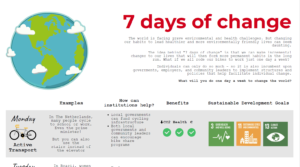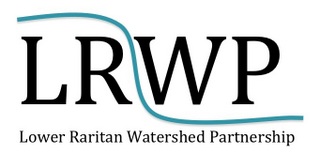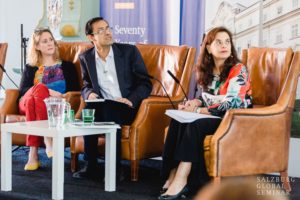“Building Healthy, Equitable Communities” – the LRWP at Salzburg Global Seminar
Article by Heather Fenyk, photo credit Salzburg Global Seminar/Katrin Kerschbaumer
Earlier this month I traveled to Salzburg, Austria to take part in the Salzburg Global Seminar Session “Building Healthy, Equitable Communities: The Role of Inclusive Urban Development and Investment.” I was invited to discuss the role of citizen science in watershed management and land use planning, and my presentation highlighted issues and opportunities in New Jersey’s Lower Raritan Watershed. More specifically, I linked the work of Lower Raritan Watershed Partnership volunteers who collect water quality data and map stormwater infrastructure with desired human and environmental health outcomes.
Salzburg Global Seminar “Data and Evaluation Round Table” Participants, October 2018
The Salzburg Global Seminars started in 1947 as an international forum for post-war healing. The intent was to bring global actors together to develop a “Marshall Plan of the Mind” as a critical element of post-war recovery. Seventy years on, Salzburg Global Seminars continues to nurture global networks of researchers, policy makers, activists and advocates around pressing issues and concerns. My cohort of 50+ Fellows from 16 countries joined together for a week of discussions on themes including:
How can we leverage trends and opportunities in urban revitalization with investments in infrastructure to focus on health, equity and the public good?
Are there key policy strategies or practices that support healthier and more equitable housing, transportation, utilities and park/open space/environmental systems?
How can we foster a shared sense of community in the built environment? Can that lead to infrastructure in the public interest?
Can, and how can, data and citizen science be used to direct resources and promote equitable development?
Seminar discussions were punctuated with case study presentations and problem solving “labs,” and we soon organized ourselves into working groups to develop theoretical statements, policy proposals, and frameworks for practice and action.
I was part of two working groups. One of the working groups, which included individuals from Hong Kong, New Zealand, Australia, Spain, Canada and the United States, set out to address immediate community needs related to the fragmentation of habitat in our built environments. This group designed a tool to map and prioritize underutilized community infrastructure for public multi-sharing/multi-functional use. The Lower Raritan Watershed Partnership plans to pilot the tool in the Lower Raritan Watershed in coming months. The other working group, which in addition to myself included individuals from India and Germany, developed a research agenda to address a gap in the literature related to health outcome assessments at the watershed level. Both groups have been asked to develop an issue brief for publication in a special issue of the British Medical Journal.
In addition to advancing research and action around healthy, equitable communities, Salzburg Global Seminars formed a global peer support network of Seminar Fellows – that is professional practitioners from around the world working in the built environment and health.

One easy-to-share tool our Salzburg Seminar Group developed is the fun 7-Days-of-Change guide, built around the United Nations Development goals!
While I am thrilled to be a part of this global initiative, I know there are also many in New Jersey and the Lower Raritan Watershed who are working to foster healthy, equitable communities. With an eye to advancing urban environmental restoration of our New Jersey landscape, and with the specific goal of marrying efforts to improve environmental and human health locally, I welcome conversations with folks who would like to create a New Jersey specific “Healthy, Equitable Communities” peer support network. Feel free to contact me at: hfenyk@lowerraritanwatershed.org

